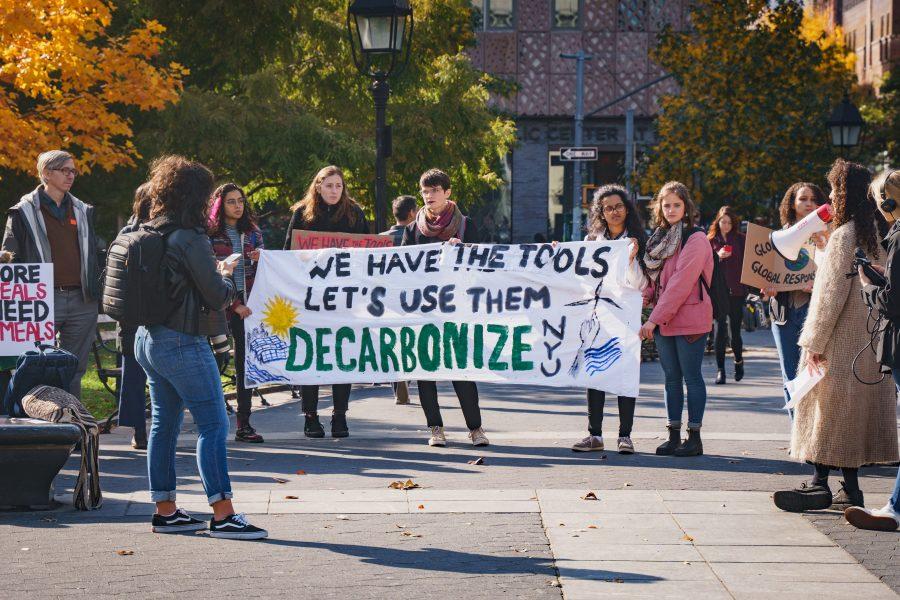After a resolution that called for NYU to divest from fossil fuels and gas plants that use fracking passed in the University Senate in April, it is now unclear how much the resolution will impact the university’s ongoing sustainability efforts.
“The Resolution for Decarbonization” was a culmination of a months-long effort between climate justice group NYU Divest and the Sustainability Advisory and Working Group, led by Assistant Vice President Cecil Scheib. The resolution passed in the Student Senators Council in October and proposed major changes to NYU’s current sustainability efforts. It calls on the university to fully phase out its usage of fossil fuels, extend its sustainability efforts to all of its global campuses and aim to become reliant solely on renewable energy by 2040.
In a statement to WSN, Scheib said that the resolution was instead supposed to serve as an aspirational roadmap to aid the university in achieving its goal of carbon neutrality by 2040.
“The resolution is aspirational and does not contemplate each challenge being resolved immediately,” Scheib wrote. “Some carbon-reduction efforts may incur a cost while other initiatives will save money.”
NYU’s current sustainability efforts differ from those stated in the resolution. The university will seek to achieve carbon neutrality by 2040 by making buildings energy-efficient and reducing plastic and food waste. Additionally, Scheib announced at a University Senate meeting in February that NYU would ban spending on plastic water bottles starting on Jan. 1, 2020.
According to Senator at-Large and Wagner graduate student Edin Thornton — who was part of the Sustainability Advisory and Working Group — the delays in presenting the resolution were due to a series of edits that needed to be made. Thorton said that the group did not receive a revised resolution from Divest until February, which made it more difficult to present the resolution at an earlier University Senate meeting.
“We met with [Divest] in December, they said they were going to work on [the resolution] and they said they would consider the concerns that the [Sustainability Advisory and Working Group] raised to them when we met with them,” Thornton said.
NYU Divest declined a request for comment.
While the resolution passed 47-40 in the University Senate, it does not need approval from the Board of Trustees because the administration is responsible for implementing sustainability initiatives, according to Scheib. However, according to the university’s bylaws, the University Senate can “make any recommendations regarding the policies and practices of the University” to the Board. The bylaws also state that the Board “may exercise all powers and take all actions not prohibited by law, the Charter or these Bylaws.”
In the past, the Board has struck down resolutions presented in the University Senate.
Before the resolution went to a vote at the April University Senate meeting, NYU President Andrew Hamilton said that the decarbonization resolution would have financial implications and policy changes for the university.
However, in a statement to WSN, the Board of Trustees confirmed that the Resolution for Decarbonization would not need to make its way up to the Board for approval and stated that it supports NYU’s current sustainability efforts.
Divest’s decarbonization resolution is not the first to call for complete divestment from fossil fuels. In April 2015, Divest pushed for a different resolution that asked for NYU to halt investments in fossil fuels and to make investments that do not contribute to the fossil fuel industry. Unlike the decarbonization resolution, the fossil fuel resolution needed approval from the Board and was struck down in June 2016. Hamilton and Board Chair William Berkley said at the time that the resolution was making a political statement rather than combating climate change.
Scheib said that the university had already planned to implement certain initiatives similar to those mentioned in the resolution that the Sustainability Advisory and Working Group recommended, and asserted that it would continue with those initiatives. He did not say if or when the university would adopt any of the other initiatives mentioned.
“Some of the resolution items are similar to near-term sustainability initiatives from the university-wide [Sustainability Advisory and Working Group], which included students, faculty and administrators from across the global network,” Scheib wrote. “As a result of that process, NYU is also pursuing some of the resolution items, as well as many sustainability initiatives besides the ones recommended by the resolution.”
Email Meghna Maharishi at [email protected]


























































































































































